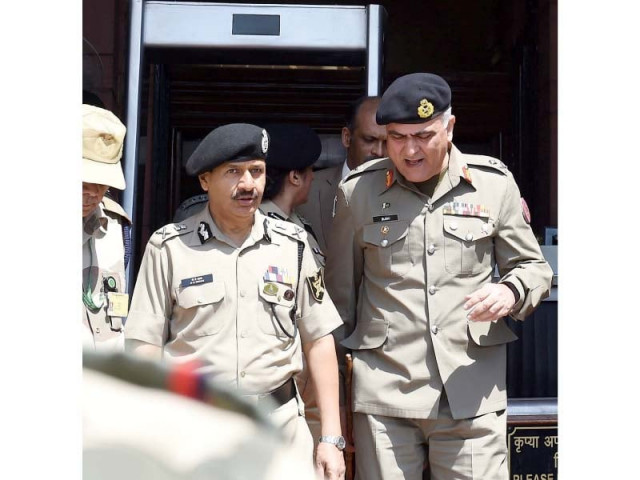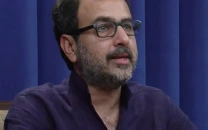DG-level talks: India won’t fire first bullet, assures Rajnath
Asks Islamabad to ensure terrorists don’t infiltrate India

India BSF Director General talks with Pakistan Rangers Director General (Punjab) after a meeting with Indian Home Minister Rajnath Singh in New Delhi. PHOTO: AFP
India has assured Pakistan that the Indian forces would not fire the first bullet along the border between the two countries so long as Pakistan ensures that terrorists do not infiltrate into India from the Pakistani side.
The exchange between Indian Home Minister Rajnath Singh and Pakistan Rangers (Punjab) Director General (DG) Maj Gen Umar Farooq Burki came on Friday, hours after a battle in the town of Handwara in Indian-held Kashmir that left two army men and two terrorists dead.
A Burki-led Rangers delegation is in Delhi on a three-day visit to hold talks with India’s Border Security Force (BSF) to discuss ways of reducing tension along the border. The DG-level talks will conclude on Saturday.
On Thursday, the directors general of the Rangers and the BSF had agreed to end ceasefire violations by devising new strategies, like joint patrolling in some areas along the border in the disputed Kashmir territory.
They had discussed that the troops across the international border could start speaking to one another more frequently to swiftly sort out local issues at lower levels.
On Friday as well the Rangers raised the need of greater communication between the two border guarding troops.
“India wants friendly relations with all its neighbours,” Singh was quoted by the Press Trust of India as telling Burki. “India will not fire the first bullet towards Pakistan along the border.”
The Indian minister said that both Pakistan and India must unite against the menace of terrorism. “Like India, Pakistan too is a victim of terrorism.”
He said India wanted to engage in dialogue with Pakistan on different levels, which was why Indian Prime Minister Narendra Modi had met Pakistani Premier Nawaz Sharif in Ufa in July.
Quoting former Indian PM Atal Bihari Vajpayee, Singh said: “We can change our friends, but not our neighbours.” This is why it is necessary to have cordial relations with all the neighbouring countries, added the home minister.
Indian aggression slammed
Through a resolution unanimously adopted on Friday, the Senate Standing Committee on Defence condemned Indian aggression and ceasefire violations across the Line of Control (LoC) and the working boundary, and urged the international community to take immediate notice of the situation. The high-level meeting was presided over by the panel’s chairman, Senator Mushahid Hussain Syed.
The Senate Defence Committee observed that ever since Modi became India’s premier, the statements and actions of our neighbour had become aggressive and jingoistic.
Through the resolution, the Senate panel urged the international community, especially the United Nations (UN), the European Union and the Organisation of Islamic Cooperation, to take immediate note of “this premeditated and systematic campaign on the part of the Indian government and its military, which is aimed at destabilising Pakistan and diverting attention away from the successful and unwavering Operation Zarb-e-Azb”.
The committee strongly felt that enduring peace, security and stability in South Asia could only be attained when India abides by its commitment to the UN resolutions regarding the right of self-determination for the people of Kashmir.
Earlier, the body was informed that 221 cross-border violations had recently been committed by the Indian forces in which 26 civilians had died and 78 injured. The panel was told that the Pakistan formation commanders had sent 39 hotline messages at the brigade level to their counterparts in the Indian military but to no avail.
Defence Secretary Lt Gen (retd) Alam Khattak said in his statement before the committee that Pakistan followed the policy of restraint. “Pakistan is a mature state. Only a fool would want a war in these circumstances.”
Meanwhile, the panel was also apprised of a compensation package to the tune of Rs183 million for 22 of the victims of the Army Public School Peshawar attack.
Published in The Express Tribune, September 12th, 2015.


















COMMENTS
Comments are moderated and generally will be posted if they are on-topic and not abusive.
For more information, please see our Comments FAQ